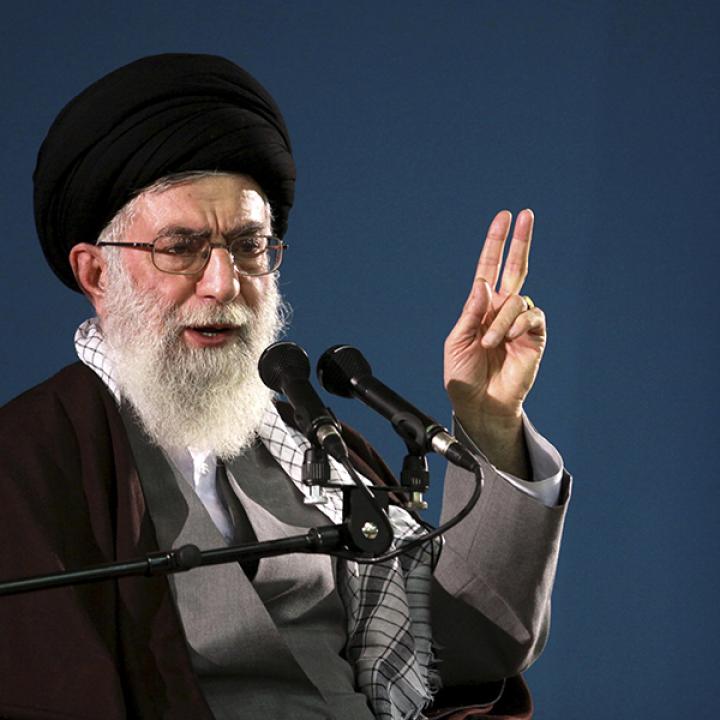
- Policy Analysis
- Fikra Forum
The Developing Cracks in Khamenei’s Cult of Personality

Until now, Iran’s supreme leader Ayatollah Ali Khamenei had been happy with the comparisons his hard-core supporters make between him and Ali ibn Abi Talib—Shia Islam’s first divinely ordained Imam. Ironically, this insistence on Khamenei’s infallability, combined with the current acquiescence to strategic flexibility or policy concession, is eroding that sense of trust with Khamenei’s core base of hardline supporters.
Ali ibn Abi Talib (also known as Imam Ali), the son-in-law of the Prophet Muhammad, was Islam’s fourth caliph, ruling from 656 - 661 CE. From the outset, Imam Ali and his followers believed he was the Prophet Mohamed’s rightful successor and were aggrieved that he had to wait through the rule of three predecessors before assuming leadership. This assertion that Prophet Muhammad appointed Ali to lead the Muslim community after his death led to the initial schism in the Muslim community and remains a core tenet of Shia Islam today.
In 657 CE, conflict erupted between Ali and Muawiya, the Umayyad governor of Syria. Muawiya, who refused to recognize Ali’s caliphate, then accused Ali of failing to bring to justice those responsible for the assassination of the previous caliph Uthman. When Ali agreed to arbitration with his rival, some of his more radical supporters—later known as the Kharijites—turned against him after the agreement with Muawiya, seeing this decision as a betrayal of what they considered the pure principles of Islam. Eventually, one of their members (Abd al-Raḥmān ibn Muljam) assassinated Ali in 661 CE, believing he had compromised the cause of divine justice.
Fast-forward to today. Ali Khamenei—the Iranian regime’s supreme leader, who views himself as the rightful leader of the Islamic World—has spent more than four decades presenting himself as a modern-day parallel to Imam Ali, with increasing success among a subset of Iranians. Khamenei’s propaganda machine claims that he is emulating every aspect of Ali’s Islamic governance, including his rule over the Islamic Republic.
Khamenei has likewise implemented this messaging across the Iranian armed forces, including grounding Iran’s overarching military tradition in Imam Ali’s Alavi doctrine, which justifies fighting with other Muslims who are perceived as deviating from “true Islam.” In addition, the supreme leader has ensured that the propaganda of the Islamic Revolutionary Guard Corps—Khamenei’s ideological paramilitary—openly compares him to the first Shia Imam. The supreme leader has also welcomed his supporters to draw parallels between him and Imam Ali, despite the objections of some religious groups, which see this as blasphemous and un-Islamic.
This emphasis would reach new heights from 2010 onwards, when Khamenei began to create a cult of personality based on the idea that he, like Imam Ali, was quasi-infallible. Some of his followers claimed Khamenei had obtained “attained infallibility”—in other words, he is incapable of doing wrong due to divine support—a stage he supposedly achieved because of his uniquely pious and religious character. Again, this idea was rebuffed by most Shia scholars as blasphemous. Nevertheless, the claim resulted in an order that all of Iran’s armed forces henceforth formally refer to Khamenei as “Imam”—a holy title in Shia Islam reserved exclusively for the twelve divinely ordained Shia descendants of the Prophet Muhammad.
And while most Iranians rejected this depiction, a small but radical ideological core of the regime, not least within the IRGC, embraced this belief. Those who followed this cult of personality began to interpret Khamenei as a semi-divine and quasi-infallible extension of the tradition of Shia Imams, as demonstrated in the terminology deployed to discuss Khamenei and his close associates. Not only did these hardliners begin to refer to the late IRGC Quds Force chief Qassem Soleimani as “Malek Ashtar-e Ali” (a respected military commander and one of the most loyal and prominent companions of Imam Ali), but IRGC-affiliated clerics even claimed that when Khamenei was born, his first words were “Oh Imam Ali.”
This cult of personality has likewise interpreted Khamenei’s war on Israel and appetite to eradicate the world’s only Jewish state through the historic Battle of Khaybar in 628 CE, when Imam Ali famously destroyed a Jewish fortress at Khaybar and later killed the Jewish population in Medina. IRGC propaganda has openly stated that “Ali’s sword will conquer Khaybar again.”
Yet this belief in and expectation of infallibility from Ayatollah Khamenei has been increasingly challenged by geopolitical realities. The Ayatollah’s continuous miscalculations, misjudgments, and consistent U-turns have begun to crack this veneer for his radical cult of personality, repeatedly challenging the belief that their master (or moraad in Farsi) can do no wrong due to his special divine connection.
These cracks in Khamenei’s hardline base have deepened significantly following a series of perceived ideological betrayals since the October 7 attacks on Israel. Among these are the failure to prevent the decimation of Hezbollah and Hamas, the loss of Syria to Sunni Islamists, and Khamenei’s green-light to enable the so-called reformist Masoud Pezeshkian to win the presidency instead of hardline zealot Saeed Jalili—an intervention hardliners have seen as a major betrayal.
But it is the latest ideological betrayal that has proved the most significant in inflaming tensions. After spending two months rejecting talks with the United States, the news that the Iranian regime will be directly negotiating with Trump—who hardliners remember as the murderer of their messianic Soleimani—has resulted in significant backlash among this demographic. After publicly condemning negotiations with the United States as “unwise, unintelligent, and dishonorable," Khamenei’s private acceptance of talks with Trump have put his flip-flopping on display for all.
In response, members of the hardcore base have taken to social media, enraged that Khamenei would "trample" on Soleimani’s blood after successively vowing “hard revenge” against the U.S. president. As Saeed Ghasemi, a former IRGC commander and one of the most radical leaders of an IRGC-affiliated paramilitary group, recently asserted: “who would have thought that this regime would trample on the blood of the general and negotiate with Soleimani’s killer.” The fury of his radical cult of personality over Khamenei’s negotiations with the regime’s arch-enemy evokes strong historical similarities to the rebellion Imam Ali faced when he sought to compromise with Muawiya.
Aware of this, in an attempt to placate his radical followers, Khamenei delivered a major speech on April 24, where he compared his regime’s talks with Trump to Imam Hassan’s negotiations with his arch enemy Muawiyah. Khamenei said that Imam Hassan had been able to appease his angry followers by telling them that a deal with Muawiyah was “temporary” and a necessary “delay” in the final war and victory against the enemy.
While this radical constituency is even now grappling with the implications of these negotiations for their worldview, Khamenei may see his cult of personality crumble if negotiations with Trump lead to an agreement to dismantle Iran’s nuclear program. While it is likely that there will be a group within his current hardline supporters that remains loyal to Khamenei and will seek to justify his compromise—blaming the government of Masoud Pezeshkian and societal pressure for this outcome—the disillusionment of yet another perceived ideological betrayal is also likely to result in members of the hard base abandoning Khamenei’s cult of personality and their support for the Ayatollah.
This fracture will weaken Khamenei’s oppressive system, as these individuals are central to its operation. While Khamenei has created what appears as an all-encompassing machinery to protect himself and maintain power, this apparatus is made up of the most indoctrinated and radical members of his cult of personality, and thus those who are most likely to take a perceived betrayal to heart. In other words, it is no longer unforeseeable for those zealots around Khamenei to turn on him in a way that is not too dissimilar to Imam Ali’s radical supporters.
Due to the way in which Khamenei has completely personalized power in the Islamic Republic and undermined the regime’s institutional autonomy, he has left himself vulnerable to accusations of hypocrisy from those who were once his most loyal followers, further destabilizing the Islamic Republic's architecture.
And no matter the outcome of negotiations with Trump, Khamenei may have already lost. The ayatollah’s dealings with Soleimani’s murderer are likely to shatter his own cult of personality and destroy his perceived sole legacy—namely, the beacon of anti-Americanism—in the eyes of Islamists and anti-imperialists worldwide.



